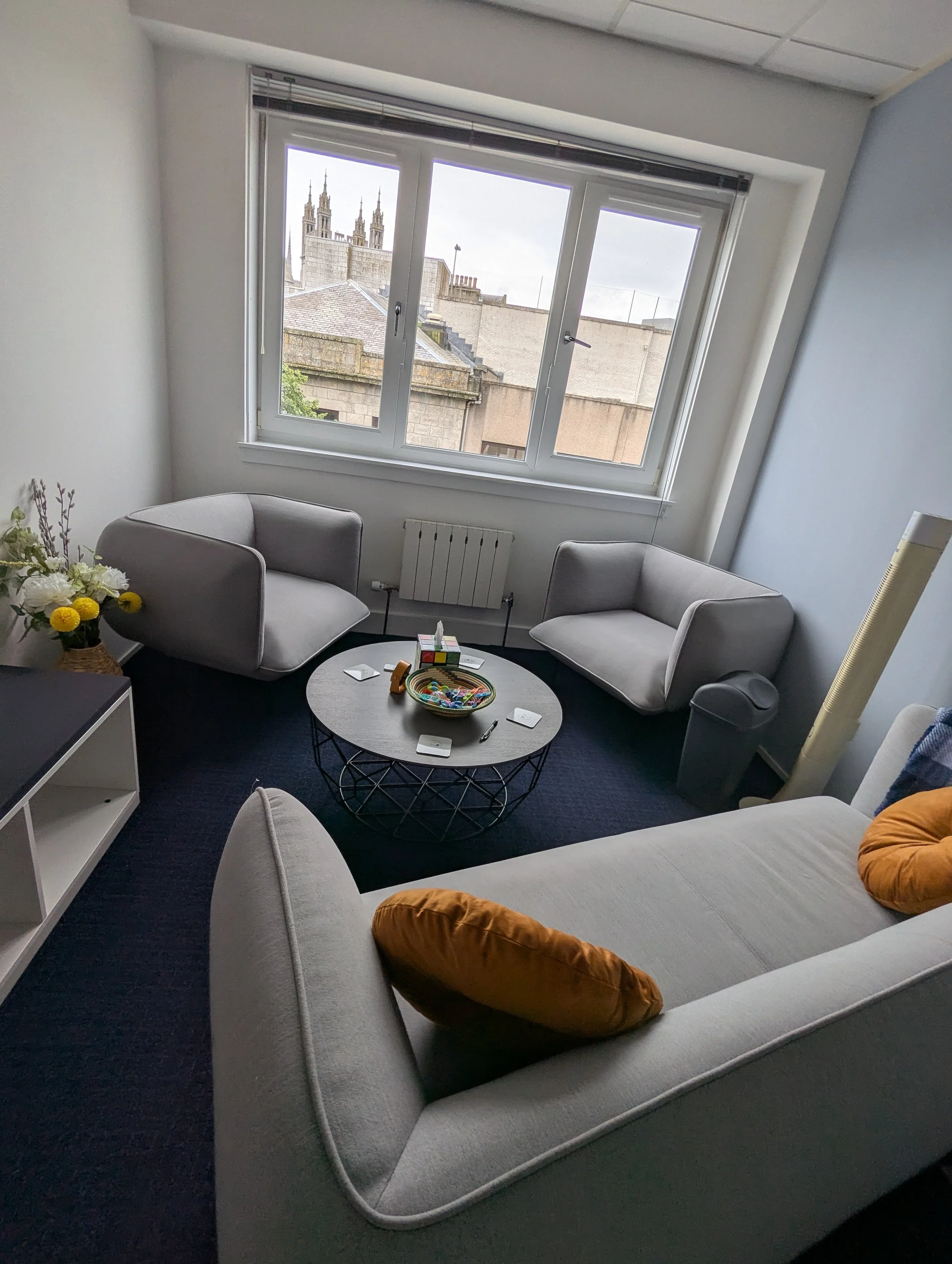Contract & Policies

Frequently asked questions
General Questions
-
Person-centred therapy is a form of talking therapy that focuses on creating a safe, non-judgmental space where you can explore your thoughts, feelings and experiences at your own pace.
Developed by psychologist Carl Rogers, this approach is built on the belief that you are the expert in your own life, and that with the right conditions (empathy, genuineness and unconditional positive regard) you have the capacity to grow, heal and make meaningful changes.
Rather than giving advice or directing the conversation, the therapist works alongside you, offering support and understanding as you find your own answers and direction.
-
Person-centred therapy can support you with a wide range of emotional and psychological challenges. These may include:
anxiety
low self-esteem
depression
stress
relationship issues
grief
identity questions
the effects of trauma
Because it’s a flexible, non-directive approach, it’s also helpful if you're feeling stuck, unsure of yourself or simply needing a space to be heard without judgment. The focus is on helping you make sense of your experiences, reconnect with your values and move toward greater self-understanding and personal growth.
-
We welcome anyone who feels they could benefit from counselling. Our team works with people from all walks of life, and we’re here to support you, wherever you’re at.
Gordon and Ethan work with adults, supporting a range of issues from stress and low mood to life transitions and self-exploration. Gordon has particular experience working with grief.
Miles offers counselling for both adults and children & young people (CYP), providing a safe and compassionate space for all ages.
Zoe works with adults and has particular experience in working with those who identify as neurodivergent or who want to explore experiences related to ADHD, autism or other forms of neurodiversity.
If you're not sure who might be the right fit, feel free to reach out—we’re happy to help you find the best match.
-
What you share in counselling is confidential. That means we won’t share what you say with anyone outside of the service unless you give us permission to do so.
There are some rare exceptions to this—if we believe you or someone else is at serious risk of harm, we may need to break confidentiality to keep people safe. If that ever came up, we’d aim to talk with you about it first wherever possible.
Your privacy and trust are really important to us, and we’ll always treat what you share with care and respect.
-
Yes, all of our therapists are fully qualified and bring a wealth of experience and training to their work.
Ethan, Gordon and Miles are qualified person-centred therapists, each holding a Postgraduate Diploma (PGDip) in Person-Centred Counselling from the University of Aberdeen. Zoe is a qualified Trauma & Somatic Counsellor holding qualifications from ISOHH, bringing a body-based and integrative approach to her work.
We’re committed to ongoing learning and professional development, and all our therapists receive regular supervision to ensure safe, ethical and high-quality practice.
Working together
-
Each counselling session lasts 50 minutes.
This is your dedicated time to talk, reflect, and be heard without pressure or judgment. Sessions usually happen weekly, but we can discuss what works best for you.
-
That really depends on you. Some people find a few sessions are enough to work through a specific issue, while others choose to come for longer to explore things more deeply.
There’s no fixed number. We’ll move at a pace that feels right for you. You’re never tied in, and you can stop whenever you feel ready. We’ll regularly check in together about how things are going, so you feel supported in making the right choice for you.
-
Most people choose to have counselling once a week, as regular sessions can help build trust and keep the momentum going.
That said, it’s completely up to you. We’ll work with you to find a rhythm that suits your needs, whether that’s weekly, fortnightly or something else. You’re always free to review or adjust the pace as things change.
-
Session costs vary slightly depending on the therapist and whether you’re meeting in person or online:
Ethan
– £60 per session (in-person only)Gordon
– £60 per in-person session
– £40 per online sessionMiles
– £60 per session (in-person or online)Zoe
– £90 per session (in-person or online)
We believe in making counselling as accessible as possible. If cost is a concern, our therapists offer limited concession spaces depending on availability. You can find more information on concession spaces on each of our therapist’s bios.
-
If cost is a concern, our therapists offer limited concession spaces depending on availability. You can join the waiting list on each of our therapist’s bios by clicking the sign up button.
-
The consultation is a free 30-minute chat where we can get to know each other and see if we’re a good fit.
We’ll explain how we work, what person-centred therapy involves and answer any questions you might have. It’s also a chance for you to share a bit about what’s bringing you to counselling, and to talk through practical details like session cost, frequency and what you’re hoping for from therapy.
There’s no pressure to commit, this is simply a space to explore whether working together feels right for you.
-
Therapy is your space to talk about whatever feels important to you, whether that’s current challenges, past experiences, relationships, emotions or simply making sense of who you are.
In person-centred therapy, you lead the way. Your therapist won’t give advice or set an agenda, but will listen with empathy, acceptance and respect, helping you to explore your thoughts and feelings at your own pace. Over time, many people find this space helps them feel clearer, more confident and more connected to themselves.
There’s no right or wrong way to use therapy, it’s about what you need, in your own time.
-
That’s completely okay. You don’t need to have it all figured out or come in with something specific to talk about.
Many people feel unsure at first, especially if it’s their first time in therapy. Your therapist will meet you where you are and help create a space where you can take your time. Sometimes just sitting with someone who’s really listening can be the start of something important.
There’s no pressure, we’ll go at your pace.
-
Not usually. In person-centred therapy, we won’t lead with lots of questions or try to direct the conversation. Instead, we create space for you to explore what feels important in your own time.
Your therapist might gently ask something now and then to better understand or to help you go deeper, but there’s no pressure and no checklist to work through. The focus is on listening, not interrogating, so you’re always in control of what you choose to share.
-
Not unless you want it. In person-centred therapy, we don’t typically set homework or tasks between sessions. The focus is on creating a space where you can explore things in your own way, without pressure or expectations.
That said, if you find it helpful to reflect, journal or try something between sessions, your therapist can support you with that, but it will always be your choice.
Practical
-
We’re based in the HQ Building at 1 Berry Street, Aberdeen, AB25 1HF. It’s a central, easily accessible location with nearby parking and good public transport links.
We’ll send you all the details, including how to find us and what to expect when you arrive, when you book your first in-person session.
-
There’s parking available near the HQ Building, including the Gallowgate Car Park and the Bon Accord Car Park, both just a short walk away.
We recommend arriving a few minutes early to give yourself time to find a space and settle in before your session.
-
Yes, our counselling room is accessible. The building has two elevators that provide access to the second floor, where we’re based.
If you have any specific access needs or questions, feel free to let us know—we’re happy to help make your visit as comfortable as possible.
-
When you arrive for your session, you’ll find seating available in the foyer on the ground floor of the HQ Building. One of us will usually meet you there. If we’re not there right away, there’s a receptionist on hand who can let us know you’ve arrived.
We’ll then accompany you to the second floor via the elevator and show you to the counselling room. Once inside, you’re welcome to choose wherever feels most comfortable to sit—this is your space.
-
Not at all. While we offer in-person sessions at our Aberdeen location, we also provide online counselling if that suits you better. Some people prefer the comfort and convenience of working from home, while others value being in the room together, it’s entirely up to you.
We’re happy to talk through both options during your consultation so you can choose what feels right for you. Please be aware that Ethan is unable to offer online sessions.
-
Yes, our room is just a few steps away from a small kitchen where we can make tea, coffee or offer you a glass of water before your session begins.
You're welcome to bring your own drink too, whatever helps you feel comfortable and at ease during your time with us.
-
Life happens, and we understand that sometimes plans need to change. You’re welcome to cancel or reschedule your session any time up to 24 hours in advance at no cost.
If something urgent comes up, your therapist will always do their best to work with you to find a suitable alternative time.
If you cancel or reschedule with less than 24 hours' notice, the full session fee will still apply. The best way to let your therapist know is by email—the time stamp on the email will serve as the official notice.

